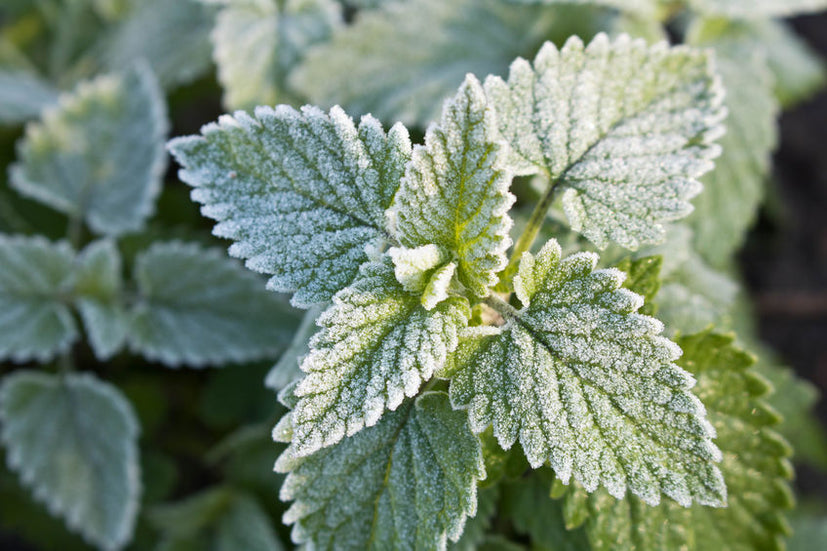10 Ways to Protect your Plants from Winter Frosts

Why worry about frost?
We wouldn't want you to wander out into the garden this winter to pick some fresh herbs for your breakfast eggs only to find black mushy leaves. You'd be surprised at how much damage frost can do from just one freezing morning!
Frost forms when the temperature falls below 0℃ and if there's water vapour in the air. These low temperatures can cause some plants cells to shrink, forcing water into spaces between the cells where it can freeze. This forms ice crystals which can result in damage to the plant's cells.
Where we live here in South East Queensland we rarely get frost. We have had the odd bad one though - one of which broke our solar hot water system and froze all the hoses and the birdbaths. We did manage to get the hoses thawed and flowing, and I watered all the tender herbs before the sun hit them.
This worked really well and we didn't lose many plants at all. For us, winter in the nursery means setting the sprinklers to come on before the sun hits the plants - just in case.
Here are some ideas from us and our customers that can help protect your plants from frost.
1. Get to know your Plants
Find out what plants in your garden could be affected by frost. These are the ones that you can concentrate on protecting first.
Make a list of them and put it somewhere easy to find so you can work quickly in the afternoon before a suspected frost.
Which herbs need protection from frost?
Tropical and subtropical herbs will need protection such as turmeric, curry leaf tree, gotu kola, vegetable pepper, and galangal. Most Mediterranean herbs such as rosemary, thyme oregano and lavender will take light frosts. Hardier winter herbs can be found in our winter herbs collection.
2. Seaweed solution
In the weeks before the cold sets in, start watering your herbs with seaweed solution. We use eco seaweed, but you can also use seasol or other seaweed solutions.
Eco seaweed stimulates healthy growth. It increases the ability of plants to withstand extreme cold. You can apply eco seaweed weekly.
3. Mulch

Spread a 10cm layer of cane, lucerne or pea straw mulch around your herbs to protect the roots from ground freezes.
4. Check the weather forecast
It is important to know what the overnight temperature is going to be. And what the expected maximum temperature will be the next day. You can then prepare to keep frost tender plants safe.
5. Ensure you Garden is Moist
Expecting a run of freezing weather? Ensure your garden is moist. If not, give it a good soaking during the early afternoon. The moist soil and higher humidity around the plants will moderate temperature extremes.
6. Bring them inside
Consider bringing your plants inside during winter if they are in pots. A sunny window is a perfect place to overwinter your herbs.
If you don’t have a sunny position inside take them out the next day. Herbs still need sunshine every day and some fresh air.
7. Cover with a Cloche

Cloches were traditionally bell-shaped glass coverings. You can re-use or buy something similar in plastic. These can be put over plants the afternoon before a suspected frost and removed the next day.
On young or small plants you can use plastic bottles.
- Cut the bottom off the bottle and push the cut end of the top into the soil around the plant.
- Take it off during the day or the plant may suffocate.
- If it is still really cold during the day you could undo the lid of the bottle to let some air in.
8. Old Blankets and Tomato Stakes

Utilise old blankets, hessian bags, towels and sheets to create tents for your plants. Use timber tomato stakes or bamboo stakes to make a tripod frame over frost-sensitive plants. Drape the blankets over the frames making sure they cover the ground. You may have to put some rocks or bricks on the blankets if it is windy. Remove them the next day when the sun is shining and the temperature is 10℃ to give them some fresh air and sunshine.
9. Cold Frames and Tunnels
Make some cold frames from second-hand windows and some wooden frames. They can protect plants in pots and give you a head start with seedlings. There are so many great ideas for doing it yourself on the internet. Or you can buy ready-made poly tunnels to pop over your herbs in the garden.
10. Water before the Sun Rises
If you get caught out with an unexpected frost in your garden all is not lost. Before the sun hits them try spraying your plants with a gentle sprinkle from the hose. This will thaw out the frozen plants and stop the cells from bursting when the sun hits them. Don't use warm water as it could do more damage.
Final thoughts
It is 100% worth the effort to keep your herbs growing through winter. Follow the steps above and your herbs should be perfectly ok in the colder weather! Herbs enliven your life - they are a simple way to add flavour and nutrients to your winter warming meals. And make sure to moisturise your hands when you're done, the cold air will dry them out!




